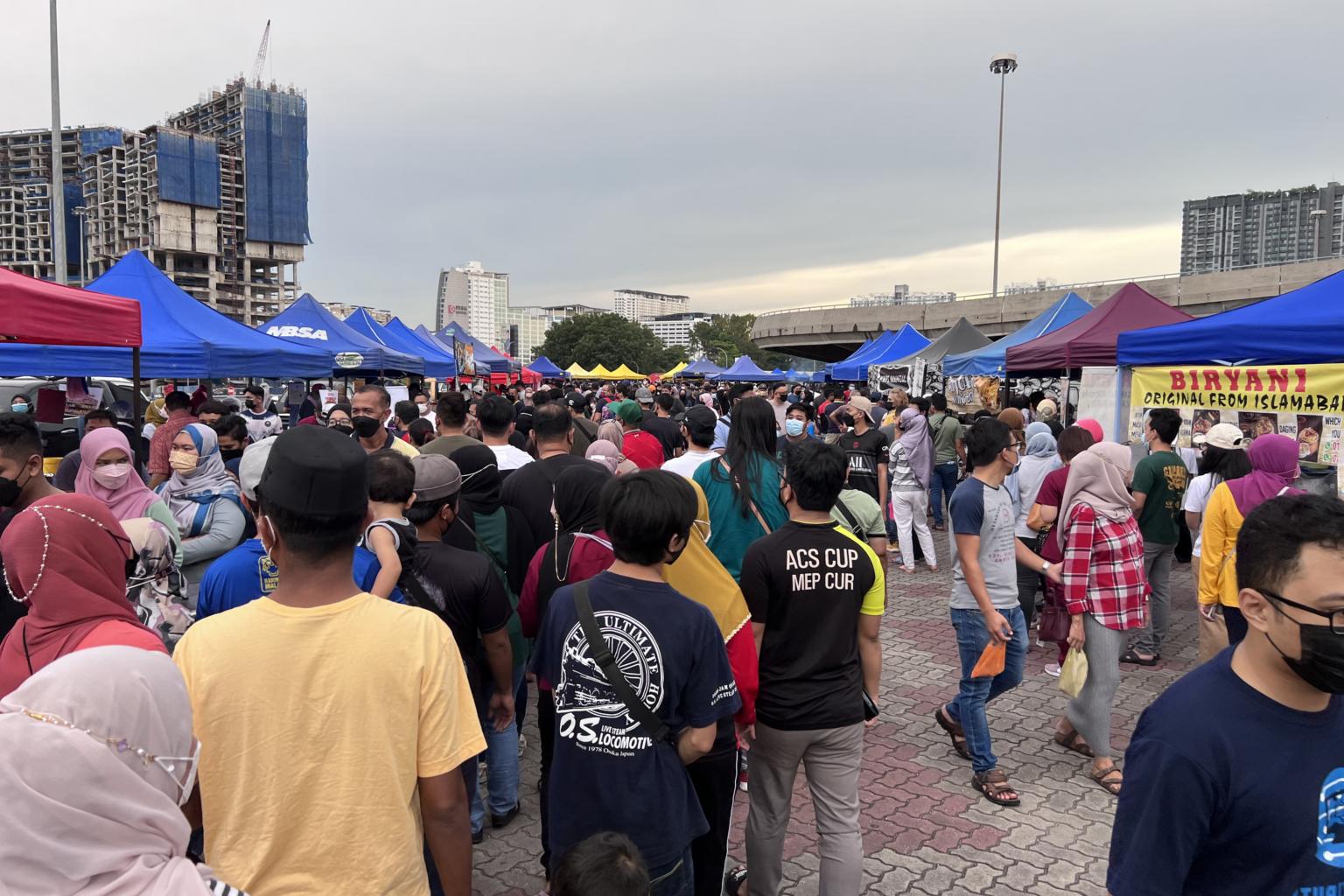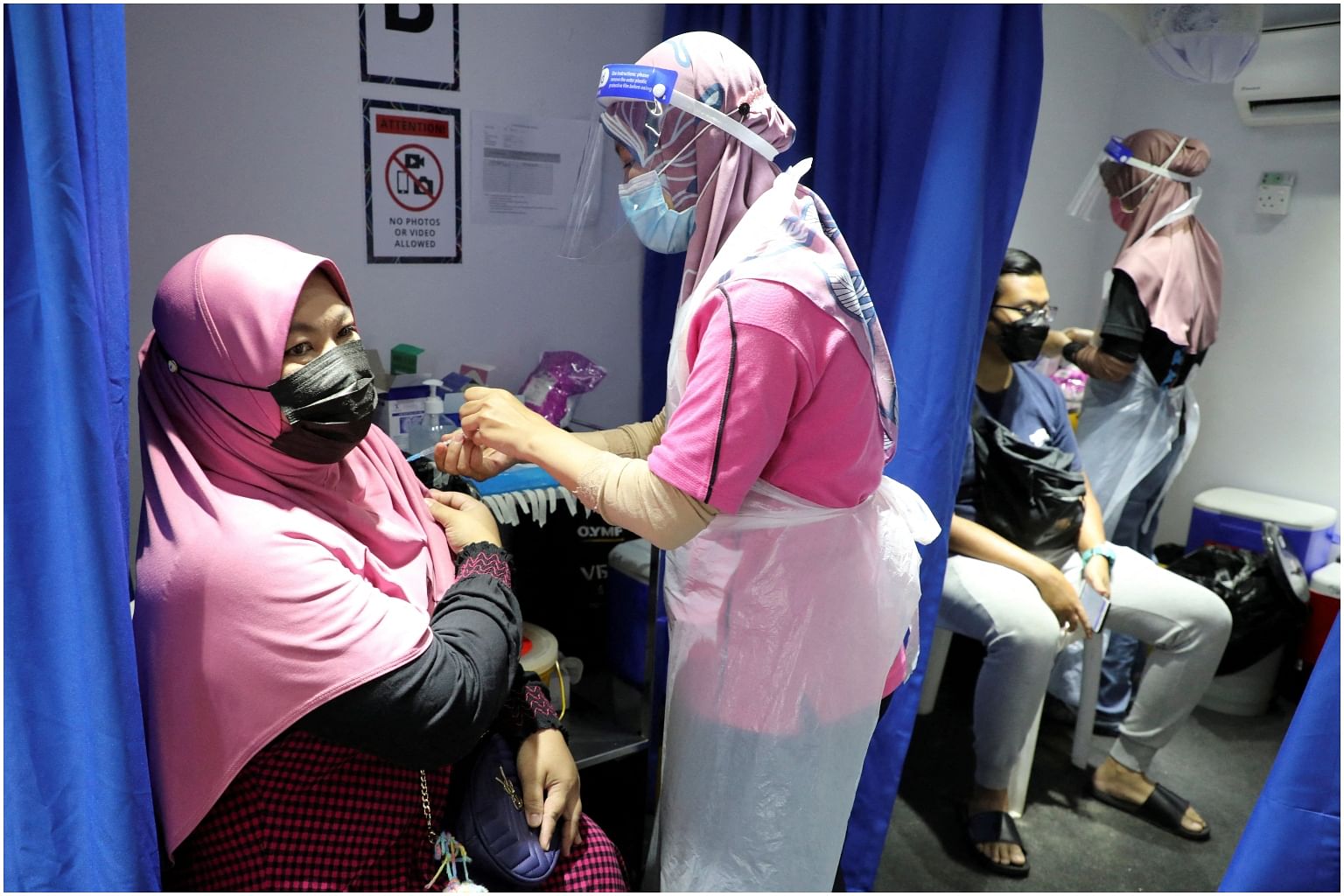Daily Covid-19 cases in Malaysia drop below 10,000 for the first time since Feb 5
Sign up now: Get insights on the biggest stories in Malaysia

Large crowds throng Ramadan bazaars in Malaysia on April 9, 2022, following the easing of Covid-19 protocols.
ST PHOTO: NADIRAH H. RODZI
Follow topic:
PETALING JAYA (THE STAR/ASIA NEWS NETWORK) - Malaysia recorded 8,112 new Covid-19 infections on Sunday (April 10), the Health Ministry said, the first time daily new cases fell below 10,000 since Feb 5 when 9,117 cases were reported.
But health experts warned that infections may rise with the threat of new variants and as more people let their guard down.
According to the CovidNow portal, this took the total number of infections in the country to 4,325,818 cases since the pandemic began.
The Health Ministry reported that there were 25 imported Covid-19 infections on Sunday, with the remaining 8,087 cases the result of local transmissions.
There were also 15,765 recoveries on Sunday with a total number of 145,799 active cases in Malaysia. No deaths were reported on Sunday.
There were 77,406 tests conducted with a positivity rate of 13.5 per cent.
A total of 731 patients were admitted to hospitals throughout the country on Sunday, with 174 warded in intensive care units (ICU) and 110 requiring breathing assistance.
A total of 40,792 Covid-19 vaccines were administered, including 6,675 booster shots.
No new clusters were identified on Sunday and there are currently 129 active clusters in the country.
After 10 days of transitioning to the Covid-19 endemic stage, public health experts are warning that infections may rise with the threat of new variants and as more people let their guard down.
However, they say the country's high vaccination rate and mask mandate continue to shield many against severe symptoms of the disease while the hospitalisation and ICU rates have remained stable.
Medical Practitioners Coalition Association of Malaysia president Dr Raj Kumar Maharajah said people no longer seem to be following the standard operating procedure, with many acting as if Covid-19 no longer exists.
"People have let their guard down. We are definitely going to see a surge in cases but the severity might not be as bad as what we saw before.
"These cases would mainly be in Categories One or Two and there will be fewer people admitted to hospital and requiring ICU care," he said in an interview.
Members of the public, added Dr Raj, have to be constantly reminded that the pandemic is "not over".
"Many people - whether in the endemic phase or in the transition to the endemic phase - can still get infected and die. We have many diseases in the world that are endemic and people are still dying from it. So, Covid-19 will be like that.
"It doesn't mean that because the disease is in the endemic stage, its threat is over," he said, urging the public to always be on guard against new strains and to continue wearing their face mask, practising social distancing and sanitising their hands.
Malaysia began its transition to the endemic phase on April 1, with the borders reopened, operation hours for businesses no longer limited and the SOP relaxed at houses of worship.
Between April 1 and 4, 252,730 travellers entered and left the country and Covid-19 cases continued to see a downward trend.

Volunteers For Community Engagement and Empowerment For Covid-19 chairman Datuk Dr Zainal Ariffin Omar believes that the country is doing well in managing the pandemic.
However, he said Covid-19 infections are still high and cases could still rise as new variants might come up.
Infections, he added, could surge since the immunity levels from the vaccines wane over time and there are still people who had yet to take their boosters.
"Community interactions are high right now. Together with an increase in religious and social events, as well as the reopening of all economic sectors and international borders, including the relaxation and non-compliance with SOP, this will cause a rise in Covid-19 cases and may cause serious infections," said Dr Zainal.
On offering a second booster to the population, he said the Health Ministry should evaluate the current situation such as the immunity levels following the first booster.
Several countries such as the United States and Britain have announced that a fourth dose of an mRNA vaccine is recommended for certain groups like healthcare workers, immunocompromised individuals and people over a certain age.
Dr Zainal agrees that the mask mandate should stay on in Malaysia but be relaxed a little, pointing out that Singapore had also made mask-wearing optional for outdoors.
"Masking should remain for certain places such as events in closed rooms, bazaar Ramadan and classrooms. Other places could be optional," he said.
Universiti Malaya Department of Social and Preventive Medicine Faculty of Medicine's Prof Dr Moy Foong Ming said the hospitalisation, ICU usage and death rates had been quite stable or even improved slightly despite daily Covid-19 cases fluctuating between 10,000 and 20,000 cases for the past nine days.
"This shows that the Covid-19 situation may not be getting worse, even though I feel there may be some under-reporting with the daily cases.
"This is because more of our relatives and friends are getting infected. But luckily with the high percentage of vaccination and booster shots, and the continuation of the mask mandate, we don't really see a spike in hospitalisation, ICU usage and deaths," she said.
Dr Moy said Europe and US had seen an increase in cases as they had let go of all SOP on top of vaccine hesitancy among certain groups.
"In Malaysia, if the surge in cases is not accompanied with an increased burden in the healthcare system and deaths, then we are on the right path to endemicity," she said.

